Syrian President Bashar Al Assad has signed into law a new bill expanding the powers of a government ministry overseeing religious affairs and limiting the term of the country's top Muslim cleric.
The draft had been amended by parliament this month after sparking controversy among Syrians at home and abroad.
The new legislation, signed into law on Friday, grants additional powers to the ministry of religious endowments, or "waqf", which already oversees Islamic affairs in Syria.
Specifically, the waqf minister will have a role in naming the next mufti.
The mufti had previously been appointed by the president, as was the case with current mufti Ahmed Badreddin Hassoun, appointed by Mr Al Assad in 2004.
The new law also sets the mufti's term, previously unlimited, at a renewable period of three years.
_________
Read more:
Muslim World League chief calls for multi-faith peace caravan
Spate of mystery killings add to insecurity for Raqqa residents still living in fear
The ‘crazy club’: Inside the British propaganda trips that seek to legitimise Assad’s barbarism
_________
The waqf minister will now oversee religious schools, head the Council on Islamic Jurisprudence, and regulate religious programming on media outlets.
The new law also stipulates that Muslim imams are not allowed to travel outside of Syria or attend any conference even inside the country without the waqf minister's permission.
It forbids preachers and religious instructors from "stoking sectarian strife" or "taking advantage of religious platforms for political purposes."
Syria's pre-war population was overwhelmingly Sunni Muslim, with smaller numbers of Shiite Muslims and Alawites, the sect from which Assad's family hails.
Christian and Druze minority communities are also scattered across the country. It appears that non-Muslim communities are not affected by the new law.
The legislation had sparked controversy this month, with many saying it was state overreach into religious affairs.
Others said it was a way to regulate religious discourse in order to "fight extremism."
In a recent television interview, current waqf minister Mohammad Abdulsattar Al Sayyed described it as a "huge achievement".
"This is the first time there's a law that issues controls and standards for religious work and conditions for appointing imams and preachers," he said.
But a Syrian lawyer told Agence France-Presse that the law was a worrying expansion of state control.
The waqf minister could now intervene "in activities unrelated to the ministry's administration, including in religious literature," said the lawyer, speaking on condition of anonymity.

